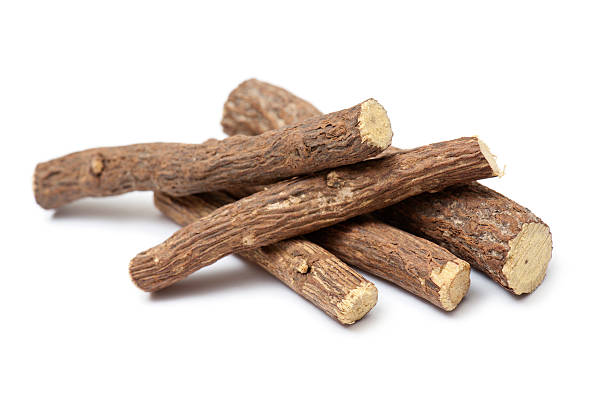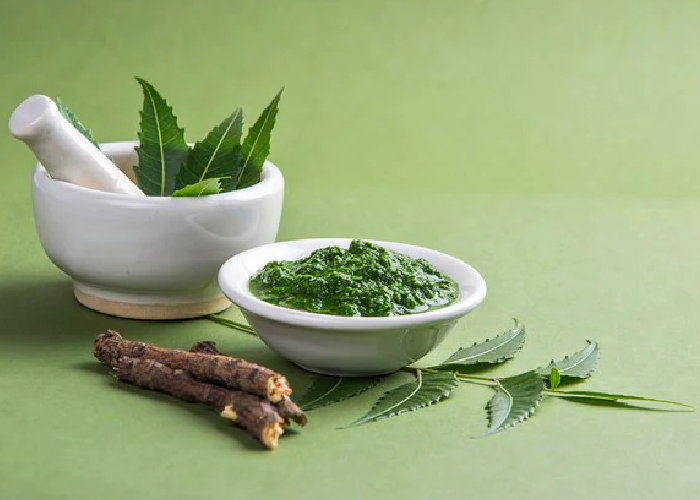Licorice or Mulethi is one of my favorite Ayurvedic herbs. It’s versatile, and beneficial, and can be termed a ‘star herb’ for its remarkable impact on health, skin and hair. Ayurvedic Significance of Licorice Licorice is called ‘Mulkethi’ or ‘Yashtimadhu’ in Ayurveda. This herb is mentioned the most number of times throughout the 8 books Acharya Charaka – the father of Ayurvedic medicine, has written. It is, in fact, used as an ingredient in many Ayurvedic medicines for different health issues; specifically, it addresses issues ranging from skin diseases to diabetes! Why I Love Licorice Tea Licorice tea has been my go-to drink for years. I’ve swapped my morning coffee for this soothing herbal tea; consequently, it’s been a game-changer for my health. Here’s why: Improves digestion: Licorice strengthens the digestive fire (Agni) and gives a great digestive boost if consumed as a morning tea. Hence, it is considered perfect for starting the day with a healthy gut. Balances Dosha: Licorice (Yashtimadhu) is categorised under sweet-tasting herbs. It helps reduce Kapha and Pitta disorders, also, it reduces fever and, in addition, is nourishing and rejuvenating. Boosts vitality: As the main ingredient of my Ojas tea, it keeps me energized throughout the day. Slows aging: Its antioxidant properties help in slowing down the aging process. It accelerates the cell renewal process and also, results in a youthful glow on the skin. Improves complexion: Mulethi brightens the skin and reduces blemishes. Its oral intake, consequently, purifies the blood and, in addition, expels the toxins from the body. Additionally, it can be used in topical face packs (in a small amount) to add instant glow to your skin. How to Make Licorice Tea So, now you know that it is a wonder herb for balancing health as mentioned in our ancient texts. Let’s make a great cup of licorice tea: Take a 1-inch piece of licorice root (not powder). Add it to 2 glasses of water. Boil and reduce it to 1 glass. Sip this warm tea every morning. You can add ½ inch of cinnamon stick and dry ginger to this tea for added benefits. This simple morning tea has improved my digestion, skin health and overall wellness. Licorice: A Word of Caution! However, it isn’t for everyone: High B.P.: Avoid if you suffer from hypertension or have a family history of high B.P. Take breaks: It’s also important to take breaks with these herbs. Consume licorice for a maximum of 3 months, pause for a while and resume. Use the root: Choose licorice root over powder for the purest form. Licorice for Hair Care Healthy, shiny hair is something we all desire, and it plays a vital role in my haircare routine. Here’s my secret hair mask recipe that works wonders: Ingredients: 3 tablespoons fenugreek seeds (soaked overnight) 1 whole egg (or flaxseeds as a substitute) 1 tablespoon yogurt ½ tablespoon hair oil (optional, for dry hair) 10g licorice powder How to Use: Blend the fenugreek seeds into a paste. Mix in the egg, yogurt, and licorice powder. Apply to your scalp and hair, section by section. Leave it on for 30-45 minutes, then rinse with lukewarm water. It acts as the secret ingredient in this mask; consequently, it promotes hair growth, adds shine, and cleanses the scalp. Trust me, it’s a game-changer! Why I Recommend Licorice From improving digestion to enhancing skin and hair health, licorice has enriched my life. If you’re looking for a natural, versatile herb that supports overall wellness, I highly recommend giving it a try. Whether it’s a warm cup of licorice tea or a nourishing hair mask, this herb is a treasure trove of health and beauty benefits. Try it and share your experience of using this wonder herb with us! If you are struggling with any health issues, you can either book a consultation with us or send us a message via WhatsApp to +91 79074 89839. We have the best Ayurvedic doctors in Trivandrum who are always glad to help you. If you have any queries, contact us. You can also visit us at our hospital.
Licorice – My Favourite Ayurvedic Herb



